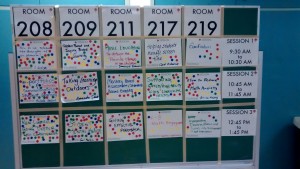I attended a professional development “unconference” called EdCamp. EdCamps are considered “unconferences” because they are completely participant driven, instead of formally held with predetermined subjects and speakers. Any attendee can propose a topic for discussion and post it to the wall. Each attendee is provided with three circle stickers that they can use to vote on the topics they would like to participate in. I proposed the topic “Problem Based and Inquiry Based Learning” because I wanted to hear from experienced educators about how they were incorporating inquiry and problem based approaches into their daily lessons.

A large group of educators attended the session, and I began the discussion by telling the group that I had begun Genius Hour with my class to ease them into the inquiry based model, but was interested in learning more about the day to day opportunities to embed inquiry and problem based approaches into the curriculum. Most of the other participants expressed the same desire to learn how to better incorporate inquiry into the classroom, and many of the teachers had also initiated Genius Hour or something similar.
Some of the educators suggested presenting students with an end point (like an answer) and asking them to figure out how the end point was reached (inquiry into the process that led to that result), which could be used in any subject from Math to Home Economics. I thought this was an interesting approach, because it takes away the risk of failure. This is in stark contrast to what I have been investigating in my practicum: the importance of risk and failure in education, particularly in supporting a growth mindset in lieu of a fixed mindset (Dweck, 2006). However, some interesting discussion was brought up around the idea of this approach, and it may be something I try in the future. I plan to continually inquire into how other teachers are incorporating inquiry into their lessons as I continue to learn as an educator.
I later attended a session on MakerSpaces. I had heard of MakerSpaces once before in the coding workshop I attended, and was interested in learning more. Several teachers discussed Maker Fairs they had hosted in their school gyms, and numerous resources were discussed and recommended. Following the session, I purchased the book “Invent to Learn“, which is about giving students the space for creating and building. I am looking forward to reading it. I also began searching the web for some more resources and came across MakerEd, which had a School Edition Manual for MakerSpaces, and I purchased an Arduino microcomputer and have begun tinkering with it.
 Follow
Follow